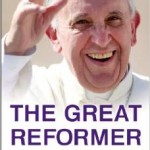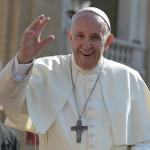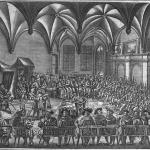Well, the clock is ticking. A final paper will soon be forthcoming from the Synod Fathers, and there will no doubt be drama, because there is always drama.
But people should remember that no matter what is handed out from the synod it’s still going to be, in a manner of speaking, a “working document”, in anticipation of next year’s synod. It is not a teaching document, nor an authoritative one; it is meant to get people thinking and praying, mostly. Some — many — may willfully chose to forget that.
One can read bulletins and reports from Rome all day and still not have the fullest possible sense of what is actually happening within the meetings of the Extraordinary Synod for the Family.
It is better to be in Rome, directly, because her very timelessness tends to strip away the dross that gets caught up in whirlwinds. When working from Rome, small exchanges over an indulgent gelato can prompt an interesting insight, or a friendly walk under the colonnades can loosen a knowledgeable tongue.
Austen Ivereigh is in Rome right now, talking to many people, and after yesterday’s angst (and today’s unhappiness) over Cardinal Kasper’s denial of his remarks to Edward Pentin, and Pentin’s quickly produced tape — and the remarkably angry, divisive, and mutually suspicious exchanges the unfolding drama had generated between Catholics of every stripe — I sought him out under the virtual Roman sky.
Meaning, I emailed him while yearning for an espresso.
I sought Ivereigh’s point of view most particularly, because he is a faithful Catholic journalist who walks a true middle path. No one who has read him, or his necessary book, How to Defend the Faith without Raising Your Voice would align him with any intra-church “movement” left or right.
Virtus in medio stat, and it was from that middle-perspective, I sought a bottom line, beyond all of the daily drama: is he seeing signs of the Holy Spirit at work? Was the perception left by Kasper — that the African bishops (and for that matter, the Eastern) were being stiff-armed to the side, disrespected and unheard — a reality?
Ivereigh was gracious enough to send me a few thoughts, on the record:
My sense is that, while the Africans have been uncomfortable with the references to homosexuality in the relatio (Cardinal Napier spoke for them when he said he was shocked it had been given to the press — tho this is normal synod practice), they’ve been fully engaged in the deliberations, and many of the synod fathers say how enriching and mind-opening their testimonies have been. Gradualism works well for them too: one African synod father spoke of difficulties when a man married to various wives converts. Do you ask him to abandon them as a condition of conversion? Pastoral challenges not normally faced by US and European bishops…
One of the eastern bishops spoke of the problems faced by married priests who feel ashamed to seek help when their marriages are in trouble, because they’re supposed to be the ones to go to for guidance. Another said the married priests’ experience was helpful in supporting couples. As in the case of the Africans, they feel fully involved and listened to.
That is reassuring. He fleshes out his thoughts and observations on the synod here:
One of the most reassuring things I have heard this week is that the Synod fathers are not, for the most part, paying attention to the media reports, and even less are they affected by the posturing of ideological lobbies, which have no impact whatsoever on the discussions. “We are seeking the will of God, not the will of any groups,” Cardinal Luis Martinez Sistach of Barcelona told us.
Almost all of the Synod fathers here in Rome – the vast majority of them presidents of the 114 bishops’ conferences from across the world – are what we can call “faithful pastoralists.” They are teachers of the Catholic faith who are loyal to the Magisterium. But they are also evangelisers. They want to walk with people, and bring them to know Christ and the salvation offered by the sacramental life of the parishes. They reject the rigorist frame that the question is whether or not to conform to the world. They see the question in terms of how best to reach the world.
It is a task made ever harder because of the collapse in the West – and increasingly in the developing world – of marriage and family. It is to meet that challenge that this year-long Synod process has been called. Its purpose is not to refine or clarify doctrine, or to repeat what is in the Catechism. Nor is to claim that there is uniformity in the Church on certain key pastoral issues. It is to discern how the Church can better come alongside contemporary society, and its broken families, in a culture where the Catholic understanding of marriage is now, to put it mildly, exotic. Its task is to help create and foster lasting, stable faithful relations, for the good of humanity.
I urge you to read the whole thing, particularly if you are feeling distressed or forgetting that God’s hand is in all things.
Also reassuring, via John L. Allen, Jr: Africans are no longer junior partners in Catholicism Inc.
Perhaps the most forceful African statement so far came from Nigerian Archbishop Ignatius Kaigama, who told a Vatican briefing Oct. 8 that some international organizations try to coerce African nations to adopt a liberal sexual ethic by making it a condition of development assistance.
“We get international organizations … which like to entice us to deviate from our cultural practices and traditions and even religious beliefs,” he said. “This is because they believe that their views should be our views, their opinions and concept of life, should be ours.”
“We say no,” Kaigama said. “We have come of age.”
Notes Allen:
This rise of Africa offers a gut check for both the Catholic left and the Catholic right in the West, in different ways.
Liberals are supposed to be all in favor of empowering the “Third World” and hearing their voices, but that tends to end when those voices say things liberals don’t want to hear, especially on sex and the family.
Conservatives cheer African Catholics who line up with them on the culture wars, but they often fidget when the conversation turns to other matters. On American foreign policy, for instance, or the ethical failures of free-market capitalism, or immigrant rights, the Africans often stake out positions that would be considered almost radically leftist in American terms.
No matter what one makes of what the Africans have to say, here’s an empirical fact of Catholic life brought into clear focus by the 2014 synod: Get used to it, because they’re not going away and they’re not going quiet.
Good. Getting past Kasper and the varying reports of contratempts — all filed, I am sure, but people who love the church and are working in good faith — I find these two reports very heartening, as I do too these words from Australia’s Cardinal Pell:
“Our task now is to ask people to pause, to pray, to catch their breath, to realize there’s going to be no abandonment of Catholic doctrine, and to work to diminish the divisions and to prevent any radicalization of different factions or points of view.”
The synod fathers are not easily manipulated idiots, and the Holy Spirit does not abandon the church as she works to renew understanding and address urgent needs.
Yes, let’s take a breath, say a prayer and try some gelato and a walk in the shade! Maybe even laugh a little.















